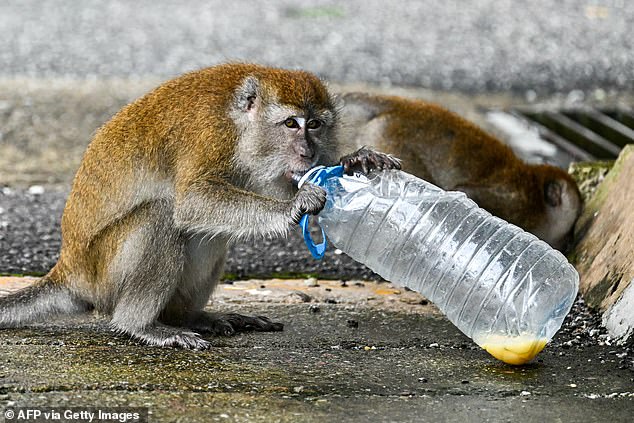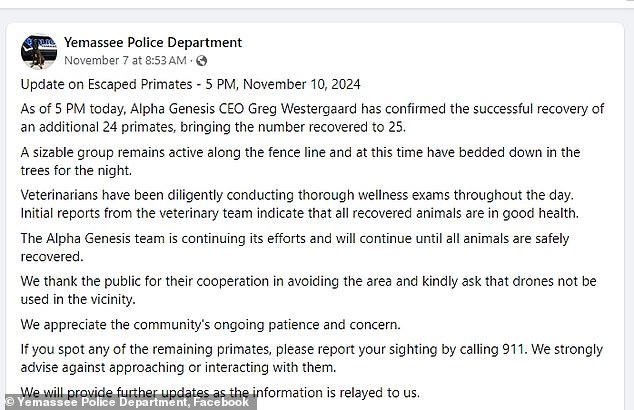A South Carolina town remains on lockdown as officials try to catch more than a dozen laboratory monkeys still on the loose.
So far, 25 of the 43 primates have been captured after escaping from a research facility called a “monkey farm” near the small town of Yemassee, which is less than 50 miles from Charleston.
Residents are urged to continue closing doors and windows as local authorities try to lure the animals with food and traps.
The six-pound rhesus macaques have taken up residence in the forest bordering the facility, cooing to their fellow primates on the other side of the fence and jumping from tree to tree.
Dr. Greg Westergaard, executive director of the facility, called Alpha Genesis, said all of the monkeys are young and healthy, and have not yet been tested, so they pose no threat to humans.
Still, the Yemassee Police Department warned against approaching the monkeys and urged citizens to call 911 if they see one.
They recommend staying away from the wooded area around the facility, where the remaining monkeys appear to be camped.
The facility, which houses more than a thousand monkeys, is located outside the town of Yemassee, 50 miles west of Charleston.
Dr Westergaard said capturing the animals could take a while, because they cannot chase the monkeys as that would scare them.
Instead, they have been leaving trails of fruit to entice the macaques to walk into traps that close behind them. But 18 remain at large.
This is not the first time monkeys have escaped from the Alpha Genesis laboratory. In 2016, 19 monkeys escaped from the research center, but were recaptured that same day.
In 2014, 26 monkeys escaped and were recaptured within days, earning Alpha Genesis a $12,600 slap on the wrist from the United States Department of Agriculture.
And there were six breakout events in 2022 alone.
A local resident recalled these previous escapes in X and said: ‘Monkeys escape from Yemassee every year. That shit happens every year! The workers forget to close the cages and go crazy!’
Charlotte Murray, a local business owner, told DailyMail.com that people have been more afraid of monkeys during this escape than in previous years.
Murray said: “The center normally does a great job during leaks, but this is the first time I remember they have asked people to keep doors and windows closed.” That’s a change.’
There are currently several thousand monkeys at this facility on over 100 acres of land. It is one of the largest monkey testing facilities in the country.
This time, the monkeys escaped after a worker locked up but forgot to close a door to their enclosure.
Dr. Westergaard said the primates probably leaned on the door and opened it. Once one realized he could leave, a whole group did the same.

Residents of Yemassee, a city of 1,000 people less than 50 miles west of Charleston, have been told to lock their doors and windows to prevent primates from entering their homes.

The rhesus macaques that escaped from the facility are all young females, weighing between six and seven pounds, about the same size as a house cat. The macaque in the photo is an adult from India, not from the Alpha Genesis facility.
Dr. Westergaard said, “It’s really like following the leader.” You see that one leaves and the others leave.’
The unnamed employee is reportedly “under disciplinary action” at this time.
The group that staged the robbery was made up of young women who had never been used in tests. They are too young to transmit diseases and pose no threat to humans.
Veterinarians were sent to the area to perform additional welfare checks on the monkeys still loose, and the police department announced that they appear to be in good condition.

The Yemassee Police Department has been providing regular updates on the status of the monkeys. A Nov. 7 update reported: “These animals are very sensitive and easily startled; we recommend that the public avoid the area to avoid scaring them further.”
At the facility, Alpha Genesis breeds, breeds and tests primates, including rhesus macaques and capuchin monkeys.
Monkeys have been used to research everything from Alzheimer’s disease to the Zika virus.
The company’s website reports that they are used in vaccine development and virus research, and they also sell primate blood, cells, and plasma to other researchers.


